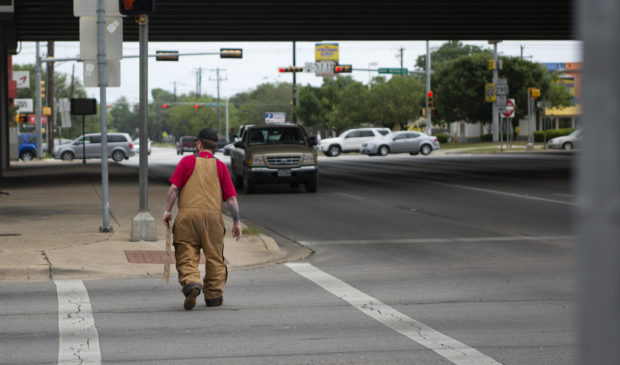About the Author
Chad Swiatecki is a 20-year journalist who relocated to Austin from his home state of Michigan in 2008. He most enjoys covering the intersection of arts, business and local/state politics. He has written for Rolling Stone, Spin, New York Daily News, Texas Monthly, Austin American-Statesman and many other regional and national outlets.
Newsletter Signup
The Austin Monitor thanks its sponsors. Become one.
Most Popular Stories
- Landmark commission says goodbye to Nau’s Enfield Drug
- Council calls for revisions for proposed MoPac South expansion
- Real estate trends point toward stable growth even after Austin loses ‘supernova’ status
- After a decline last year, Travis County homeowners should expect a return to rising property taxes
- Ethics complaints filed against Siegel, AURA
-
Discover News By District

Photo by Miguel Gutierrez Jr./ KUT News
City could revive idled homelessness prevention programs with its next budget
Tuesday, June 11, 2024 by Chad Swiatecki
The city will likely look at restarting funding for homelessness prevention programs that were largely shelved in recent years in response to receiving federal funding that prioritized rapid rehousing efforts during the Covid-19 pandemic.
Last week, City Council’s Public Health Committee received a presentation from representatives of Best Single Source Plus (BSS+), a coalition of 13 homelessness service providers who for more than two decades have partnered to rehouse those who’ve lost their homes and prevent those at risk from becoming homeless. The discussion focused on the shift those agencies and the city undertook in response to aid from the American Rescue Plan Act that required aggressive rehousing efforts and offered no resources for prevention programs.
With ARPA money for rapid rehousing programs scheduled to dwindle by late 2027, the city and all relevant entities are looking at how to continue efforts to address homelessness via prevention, rehousing aid and offering permanent supportive housing units.
Jo Kathryn Quinn, president and CEO of Caritas Austin – which leads the BSS+ collaboration – said the member organizations had to restructure their programs in response to the city’s decision during the pandemic to move away from funding programs that could identify and assist families or individuals at risk of losing their home.
“Before the ARPA dollars came in, we were using regular city dollars for those prevention funds. The ARPA dollars didn’t allow for prevention,” she said. “A decision was made somewhere in the city staff that when we got the ARPA dollars, we were just going to use those and just focus on rapid rehousing for this particular collaboration. For our collaboration, the regular city dollars went away.”
Committee members expressed surprise that the city had moved away entirely from prevention programs that in most cases can keep individuals housed at a lower cost than providing rehousing aid or placing them in permanent supportive housing units.
“It didn’t make sense the way they were describing it – that if we were going to assess somebody and think that they are likely to fall into homelessness, that then we didn’t have some follow-on action that says, OK, we’re going to invest a much smaller amount now to keep you out of homelessness than what we would spend later if you were to fall into homelessness,” Council Member Ryan Alter said. “That was surprising to hear, and I think we rightfully surfaced that concern. We’re going to learn more from staff and others about where we might have a gap that needs to be filled.”
With homelessness programs and capital expenses among the primary concerns headed into July, when Council is expected to receive the draft of next year’s budget, Alter said a report expected at the end of this month from Ending Community Homelessness Coalition would provide much of the data and direction for how the city should structure homelessness funding.
“I don’t anticipate (the budget amount) changing a lot but I do think it is going to certainly tee up – and it already has to some degree – the conversation of … ‘We are staring at the end of ARPA dollars for many of the programs that we are currently funding. So what is the next step on those?’” he said.
In response to last week’s meeting, Caritas is working with other members of BSS+ to determine the budgets and timelines for restarting prevention programs.
“We would like to do both the prevention work as well as the rapid rehousing work as our membership, but we’ve got four or five other agencies that are ready to stand up a program really pretty quickly as well,” said Julia Spann, CEO of SAFE Alliance and chair of the BSS+ executive committee. “We have the history of doing it. We’ve been partners – some of the agencies that work with people who are very vulnerable are ready and waiting to have the dollars flow through, but they can stand up the staffing fairly quickly.”
The Austin Monitor’s work is made possible by donations from the community. Though our reporting covers donors from time to time, we are careful to keep business and editorial efforts separate while maintaining transparency. A complete list of donors is available here, and our code of ethics is explained here.
You're a community leader
And we’re honored you look to us for serious, in-depth news. You know a strong community needs local and dedicated watchdog reporting. We’re here for you and that won’t change. Now will you take the powerful next step and support our nonprofit news organization?








